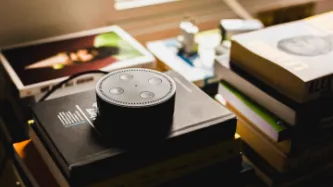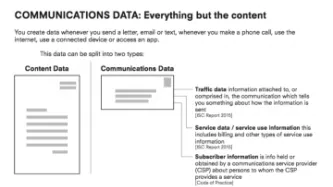Search
Content type: Long Read
This week saw the release of a coronavirus tracking app within the United Kingdom, initially to be trialled in the Isle of Wight. Privacy International has been following this closely, along with other ‘track and trace’ apps like those seen in over 30 other countries.
The UK’s app is no different. It is a small part of a public health response to this pandemic. As with all the other apps, it is vital that it be integrated with a comprehensive healthcare response, prioritise people, and…
Content type: Long Read
On 12 April 2020, citing confidential documents, the Guardian reported Palantir would be involved in a Covid-19 data project which "includes large volumes of data pertaining to individuals, including protected health information, Covid-19 test results, the contents of people’s calls to the NHS health advice line 111 and clinical information about those in intensive care".
It cited a Whitehall source "alarmed at the “unprecedented” amounts of confidential health information being swept up in the…
Content type: Long Read
Photo by Cade Roberts on Unsplash
For those of you who don't spend the most productive part of your day scanning the news for developments about data and competition, here's what has been going on in the UK since summer 2019.
Basically, the UK competition authority started an investigation into online platforms and digital advertising last summer, and issued their preliminary findings in December 2019, concluding that Facebook and Google are very powerful in the search engine and social media…
Content type: Long Read
Today is 1st May, an international day of protest. It also marks a year since PI launched our new programme of work called ‘Defending Democracy and Dissent’.
One year on we find ourselves in a situation where 1 May protests in the streets will not be going ahead. Rights have been restricted around the world. Sadly we’re seeing some actors exploit this public health crisis to enhance their own power, expanding surveillance and opportunism.
Against this challenging back-drop we wanted to…
Content type: Long Read
This review is based on information in the public domain, primarily that of the platforms themselves. It is not exhaustive and this field moves with speed - however, it aims to offer a snapshot of approaches and practices.
TikTok
TikTok is a short-form video app (owned by ByteDance) which allows advertising and sponsored content. Two thirds of TikTok’s over 113 million users (are reportedly aged 16-24) and it was the second most downloaded app in 2019, beaten only by WhatsApp’s 849…
Content type: News & Analysis
This week International Health Day was marked amidst a global pandemic which has impacted every region in the world. And it gives us a chance to reflect on how tech companies, governments, and international agencies are responding to Covid-19 through the use of data and tech.
All of them have been announcing measures to help contain or respond to the spread of the virus; but too many allow for unprecedented levels of data exploitation with unclear benefits, and raising so many red flags…
Content type: Examples
US government agencies are considering a range of tracking and surveillance technologies as part of efforts to control the spread of the novel coronavirus. These include: geolocation tracking and facial recognition systems to analyse photos, both to enable contact tracing. Palantir is working with the Centers for Disease Control and Prevention to model the virus outbreak, and other companies that scrape public social media data have contracts in place with CDC and the National Institutes of…
Content type: Case Study
In 2015, James Bates was charged with first-degree murder in the death of Victor Collins. Collins was found floating face down in Bates’ hot tub in November 2015. Bentonville police served two search warrants ordering Amazon to turn over the “electronic data in the form of audio recordings, transcribed records, text records and other data contained on the Amazon Echo device” in Bates’ home.
The reason for the warrants? According to the police, just because the device was in the house that…
Content type: Report
The changes discussed in this article are based on a second analysis performed in late November, 3 months after the original study Your Mental Health is for Sale and following the exact same methodology. All data collected can be found at the bottom of this page.
Change is possible
Back in September 2019 we published the report Your Mental Health is for Sale exposing how a majority of the top websites related to mental health in France, Germany and the UK share data for advertising purposes.…
Content type: Examples
Recent study shows that Americans are wary of data from smart speakers being used in criminal investigations, the Pew Research Center reported. A recent study showed that 49% of Americans answered that it is unacceptable for smart speakers companies to share audio recordings of their customers with law enforcement in order to help with criminal investigations. Only 25% said it is acceptable. Aparently, this result contrasts with some other data use practices measured in the same survey. For…
Content type: News & Analysis
Cloud extraction allows law enforcement agencies to take huge amounts of your data from the Cloud via a legal back door. If law enforcement seize your phone or take it from a victim of crime, they can extract tokens or passwords from the device which lets them get access to data from apps such as Uber, Instagram, Slack, Gmail, Alexa and WhatsApp.
In so doing, law enforcement agencies can avoid official channels through cloud companies such as Google, Apple…
Content type: Long Read
Mobile phones remain the most frequently used and most important digital source for law enforcement investigations. Yet it is not just what is physically stored on the phone that law enforcement are after, but what can be accessed from it, primarily data stored in the Cloud.
Cellebrite, a prominent vendor of surveillance technology used to extract data from mobile phones, notes in its Annual Trend Survey that in approximately half of all investigations, cloud data ‘appears’ and that…
Content type: Press release
A large number of apps on smart phones store data in the cloud. Law enforcement can access these vast troves of data from devices and from popular apps with the push of a button using cloud extraction technology.
Mobile phones remain the most frequently used and most important digital source for law enforcement investigations. Yet it is not just what is physically stored on the phone that law enforcement are after, but what can be accessed from it, primarily data stored in the Cloud.…
Content type: Long Read
Following a series of FOI requests from Privacy International and other organisations, the Department of Health and Social Care has now released its contract with Amazon, regarding the use of NHS content by Alexa, Amazon’s virtual assistant. The content of the contract is to a big extent redacted, and we contest the Department of Health’s take on the notion of public interest.
Remember when in July this year the UK government announced a partnership with Amazon so that people would now…
Content type: Examples
A woman was killed by a spear to the chest at her home in Hallandale Beache, Florida, north of Miami, in July. Witness "Alexa" has been called yet another time to give evidence and solve the mystery. The police is hoping that the smart assistance Amazon Echo, known as Alexa, was accidentally activated and recorded key moments of the murder. “It is believed that evidence of crimes, audio recordings capturing the attack on victim Silvia Crespo that occurred in the main bedroom … may be found on…
Content type: Explainer
Abstract
Over the past few years, smart phones have become incredibly inexpensive, connecting millions of people to the internet for the first time. While growing connectivity is undeniably positive, some device vendors have recently come under scrutiny for harvesting user data and invasive private data collection practices.
Due to the open-source nature of the Android operating system vendors can add pre-installed apps (often called “bundled apps” or "bloatware") to mobile phones.…
Content type: Long Read
A new study by Privacy International reveals how popular websites about depression in France, Germany and the UK share user data with advertisers, data brokers and large tech companies, while some depression test websites leak answers and test results with third parties. The findings raise serious concerns about compliance with European data protection and privacy laws.
This article is part of a research led by Privacy International on mental health websites and tracking. Read our…
Content type: News & Analysis
This article is part of a research led by Privacy International on mental health websites and tracking. Read our full report.
According to the World Health Organisation (WHO), 25 percent of the European population suffers from depression or anxiety each year, yet about 50% of major depressions remain untreated. This means that everyday thousands of people are looking for information about depression online. They take tests to find out how serious their symptoms are, they try to access…
Content type: Long Read
It is common ground that bulk collection of content would be a deprivation of the right to privacy. That is an inexcusable or unjustifiable step too far. Repeatedly the Government whether in litigation or legislating, has emphasised that they are not taking content in bulk. Content is the forbidden ground.
This has resulted in the Government seeking to explain, for example, what parts of an email would constitute content and meta data. Within the Investigatory Powers Act it has led to the…
Content type: Examples
In October 2018, the answers to a FOIA request filed by the Project on Government Oversight revealed that in June 2018 Amazon pitched its Rekognition facial recognition system to US Immigration and Customs Enforcement officials as a way to help them target or identify immigrants. Amazon has also marketed Rekognition to police departments, and it is used by officers in Oregon and Florida even though tests have raised questions about its accuracy. Hundreds of Amazon workers protested by writing a…
Content type: Examples
In December 2018 Walmart was granted a patent for a new listening system for capturing and analysing sounds in shopping facilities. The system would be able to compare rustling shopping bags and cash register beeps to detect theft, monitor employee interactions with customers, and even listen to what customers are saying about products. The company said it had no plans to deploy the system in its retail stores. However, the patent shows that, like the systems in use in Amazon's cashier-less Go…
Content type: News & Analysis
While people may think that providing their photos and data is a small price to pay for the entertainment FaceApp offers, the app raises concerns about privacy, manipulation, and data exploitation—although these concerns are not necessarily unique to FaceApp.According to FaceApp's terms of use and privacy policy, people are giving FaceApp "a perpetual, irrevocable, nonexclusive, royalty-free, worldwide, fully-paid, transferable sub-licensable license" to use or publish the…
Content type: Long Read
By Valentina Pavel, PI Mozilla-Ford Fellow, 2018-2019
Our digital environment is changing, fast. Nobody knows exactly what it’ll look like in five to ten years’ time, but we know that how we produce and share our data will change where we end up. We have to decide how to protect, enhance, and preserve our rights in a world where technology is everywhere and data is generated by every action. Key battles will be fought over who can access our data and how they may use it. It’s time to take…
Content type: Examples
In 2009, Amazon Kindle readers were surprised to find that their copies of George Orwell’s 1984 was missing from their devices. Amazon had remotely deleted these copies after it found out from the publisher that the third-party vendor selling them did not own the rights to the books. Amazon refunded the cost of the books but told its readers who were affected that they could no longer read the books and that the titles were “no longer available for purchase.” This was not the first time that…
Content type: Examples
From 2014 to early 2017, Amazon used an artificial intelligence (AI) hiring tool to review prospective employees’ resumes and select qualified candidates, based on Amazon’s previous hiring decisions from a ten-year period; however, the tool was much more effective at simply selecting male candidates, rather than the most qualified candidates, because Amazon had hired predominantly male candidates in the past. The hiring tool learned to discriminate against resumes that included the word “women’…
Content type: Examples
The American Civil Liberties Union (ACLU) used Rekognition, Amazon’s facial recognition software, to compare images of US lawmakers to a publicly available database of 25,000 mugshot photos. The ACLU’s study validated research that has shown that facial recognition technology is more likely to produce false matches for women and people with darker skin. Amazon’s software misidentified 28 lawmakers as being the people in mugshots, and these false matches were disproportionately of members of…
Content type: Examples
More than 450 Amazon employees delivered a letter to Jeff Bezos and other Amazon executives, demanding that the company immediately stop selling facial recognition software to law enforcement, sever connections to companies like Palantir that help immigration authorities track and deport immigrants, and provide greater employee oversight when making ethical decisions. The employees protested against Amazon allowing its technologies to be used for mass surveillance and abused by those in power,…
Content type: Examples
Amazon shareholders rejected two non-binding proposals governing its facial recognition software, Rekognition: one would have limited sales of Rekognition to governments, unless a board determined that such sales would not violate peoples’ rights, and the other was to study the extent to which Rekognition infringed peoples’ privacy and other rights. These two proposals were presented to shareholders despite Amazon’s effort to stop the votes, which were thwarted by the US Securities and Exchange…
Content type: Examples
Millions of people own smart home devices like the Amazon Echo and Echo Dot—equipped with the Alex cloud-based artificial intelligence service—which have concerning implications for privacy rights. While, Amazon’s own policies promise that only the user and Amazon will listen to what those devices record, it was recently reported that Amazon failed to follow its own policy when it erroneously shared one user’s information with a total stranger.
In August 2018, a German customer exercised his…
Content type: News & Analysis
Today, the British Health Secretary Matt Hancock announced a partnership between the NHS and Amazon to use the NHS’s website content as the source for the answer given to medical question, such as “Alexa, how do I treat a migraine?”
While we welcome Amazon’s use of a trusted source of information for medical queries, we are however extremely concerned about the nature and the implications of this partnership. Amazon is a company with a worrying track record when it comes to the way they…

























